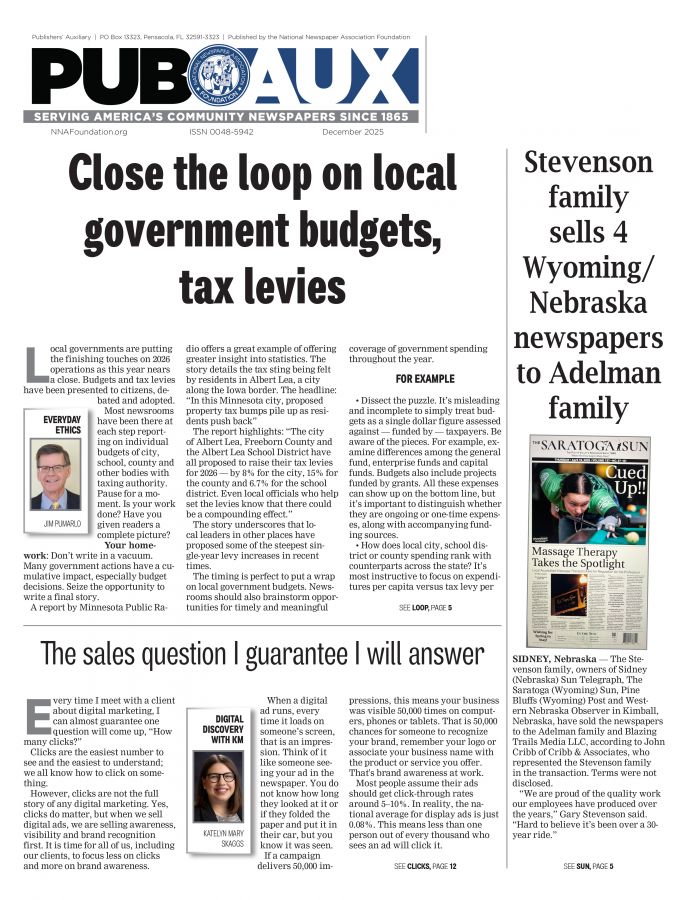GA twice-weekly fights for its community
May 9, 2016
By Teri Saylor
Special to Publishers’ Auxiliary
JESUP, GA—If it is a newspaper’s duty to print the news and raise hell, the Press-Sentinel of Jesup, GA, is answering the call and rattling Satan’s rafters over a proposed coal-ash dump at the county landfill.
Trouble was brewing a long time before anyone even noticed.
More than 20 years ago, in cash-strapped Wayne County, the Board of Commissioners approved a regional landfill facility to take in household waste.
In 1994, the landfill opened in Broadhurst, a tiny community located close to the county seat of Jesup. Two years later, it was purchased by Republic Services, a Fortune 500 company that owns 200 landfills across the country. Over time, Republic Services expanded its territory in Wayne County and today owns 2,200 acres, more than double the acreage purchased in 1996.
“Back then, smaller communities banded together to create regional landfills,” said Press-Sentinel Publisher Eric Denty. “The one in Wayne County was supposed to serve 19 counties. But at some point, Republic changed that arrangement so the landfill could accept trash from every state in the country.”
Last January, a Republic Services subsidiary filed an application with the U.S. Army Corps of Engineers to develop 25 acres of land near the landfill for a rail yard and a nearly 7-mile rail spur off the main line to serve CSX Railroad. This rail facility would be able to accommodate as many as 100 cars. Those cars would be hauling in coal ash—a lot of it.
The permit flew well under the radar. It was a sleeping giant that was about to get a rude awakening.
Derby Waters, a veteran newsman who had worked at the Press-Sentinel in his younger days, left the paper to pursue other interests, retired and returned to the paper as a part-time reporter.
One morning in early January, he had a visitor. Neill Herring, a prolific environmental lobbyist, dropped by the newspaper and told Waters he had seen an online notice announcing the Corps of Engineers’ permit application.
And that’s how the story came to light.
The hell-raising followed.
“I called the Corps of Engineers and asked them why they didn’t file a public notice in our newspaper, which is the legal organ,” Waters said in a conference call, which included Denty and Editor Drew Davis.
“And I was told they were no longer required to publish public notice advertising, because of the internet, but I could sign up to be put on a distribution list,” Waters said.
When Waters finally saw the permit application, he learned that when all the approvals come through and the rail yard is in place, those 100 CSX rail cars would be hauling in 10,000 tons of coal ash every day and dumping it into the landfill.
That adds up to mile-long trains and enough coal ash to bury a small town.
Jesup is home to 12,000 residents in southeast Georgia, located about 40 miles inland from the Atlantic Ocean. It is the seat of Wayne County. The Amtrak’s Silver Meteor stops there as it heads up and down the East Coast. Its landmass is a rural, swampy coastal plain and piney forestland.
The Altamaha River flows along the northern border of Wayne County on its way to the sea, fed by streams and tributaries along the way. It is an ecologically sensitive area.
Broadhurst is located about 10 miles south of Jesup. Sparsely populated, you won’t find much there. But if you Google the town’s name, listings about the Wayne County Landfill come up near the top of the page.
In a low-lying coastal plain, the water table is close to the land surface, and coal ash mixed with ground water makes a toxic brew.
The Press-Sentinel deployed its army of four—Denty, Davis, Waters and the newspaper’s owner, Dink NeSmith. They declared war on Republic Services, using ink and newsprint as their sword and shield, and they pledged to fund the entire battle out of their own budgets if they had to.
NeSmith reckons he has spent $50,000 so far, and he’s not afraid of spending more.
“If I have to drain my retirement, I will do so,” he declared in a phone conversation. “I have eight grandchildren and this is their heritage. I will go to my grave protecting my community and the environment.”
The Battle heats up
After Waters learned about the permit application, he started digging into the story, spending hours sifting through minutes of county commission and city council meetings, but finding nothing that would indicate the county was complicit with the coal ash agreements.
He believes the local government “got snookered,” he said. “Republic made it financially beneficial for the county, but the county didn’t read the fine print.”
On Jan. 13, the newspaper published its first article under the headline: “Company plans to bring coal ash, other waste here.” It included aerial shots of the landfill and the entire Broadhurst area.
What followed has been a no-holds-barred war. The newspaper has published dozens of articles, written mostly by Waters.
Denty hired an editorial cartoonist. NeSmith started writing fiery editorials and columns, and he invited editors and publishers of other papers to editorialize against coal ash, too.
One area of great frustration for the newspapermen has been the shroud of darkness over this issue.
Denty believes the newspaper and the public should not have to work so hard to get information about issues of any magnitude, let alone a coal-ash dump that has the potential of polluting an ecosystem all the way to the coast and poisoning every living thing along the way.
The newspaper’s editorial pages have been full of blistering commentary, but from the day the story broke, Waters was intent on providing objective, balanced coverage in the news sections.
“I toured the landfill and told its story,” he said. “I reached out to Republic officials from the get-go.”
But Waters’ requests for interviews were met with a stony silence.
“So we ran stories about the landfill and Republic’s activities with ‘no comment’ from them,” Denty said. “They did see the error of their ways, and now we have contacts in the company who will deal with us.”
Waters believes Republic Services greatly underestimated the Press-Sentinel’s ability to dig up facts, which he believes were deliberately buried, and to present them to the readers in a compelling way.
“They thought we were just a little podunk community newspaper and they could just roll over us,” he said. “They have been overwhelmed by our coverage and have realized this is not a pushover community.”
The 6,000-circulation Press-Sentinel is published on Wednesdays and Saturdays. Its entire editorial staff is Denty, Davis, Waters, another part-time reporter and a handful of stringers. In addition to coal ash, that team also covers the other, regular news of its community.
You might look at this as a modern David and Goliath story—a tiny, local newspaper taking on a $9 billion Fortune 500 company, CSX Railroad and the U.S. Army Corps of Engineers in a battle of Biblical proportions.
Shining a light
Along the way, the newspaper uncovered a chilling fact.
Coal ash is not new to Wayne County. The Jacksonville (FL) Energy Authority had been trucking it in for eight years. Along with Dan Chapman, a reporter with the Atlanta Journal-Constitution, the Press-Sentinel discovered there had already been a leak at the landfill in 2011, which had never been disclosed to the public.
Denty, who is immediate past president of the Georgia Press Association and knows his way around the state legislature, took the issue out of his newsroom and marched it straight into the state house during the assembly’s 2016 session. There he powered the passage of HB 1083, a bill that would require public notice of landfill leaks like the one that occurred in 2011.
Last March, the Corps of Engineers called a public meeting to hear the community’s concerns and answer questions.
Davis put together a 20-page, full-color section on the issue. Like a greatest hits album, the section was filled with many of the articles, columns, editorials, photos, cartoons and other content that the Press-Sentinel had carried.
“We had covered all of the issues as they arose, but we thought if we put it into a special section, it would offer a better explanation about why this is important,” Denty said. “And we thought it would provide a logical timeline that the community could easily follow.”
The section did not contain a single ad. The cost for the entire 12,000-pressrun was borne entirely by the Press-Sentinel. Copies were inserted into the Press-Sentinel’s regular newspaper and made available as a stand-alone piece.
“Eric and I made a decision that we didn’t want to appear to profit from this crisis,” NeSmith said. “If we want to ask other people to engage, we have to lead the way. We owe it to our community. Period. We put our hearts into this, and our wallets followed.”
NeSmith is president and co-owner of Community Newspapers Inc., headquartered in Athens, GA. The group’s holdings include 25 community newspapers in Georgia, Florida and North Carolina.
He is proud of every single newspaper in his CNI group, but the Press-Sentinel has a special place in his heart. Founded in 1865, the newspaper is the oldest business in Jesup. He purchased it in the early 1970s, and it is the first newspaper he ever owned.
He is not going anywhere.
“I have been publishing here for 45 years, and I’ll keep going until I am 90,” he declared.
He spends at least part of the day, seven-days-a-week, writing editorials, columns and letters, making calls and preaching against Republic Services to anyone within earshot.
He vows to never stop until he has accomplished three goals: to extract a guarantee from Republic Services that no coal ash will ever be brought into Wayne County; to convince the Corps of Engineers to deny the permit for the rail spur; and to convince the county to renegotiate its contract with Republic, imposing strict rules on the volume and type of solid waste the landfill is allowed to accept.
“If I were on my death bed, I’d get up and keep fighting,” NeSmith said. “I will do whatever it takes, and then some. If it can happen here, it can happen anywhere.”






